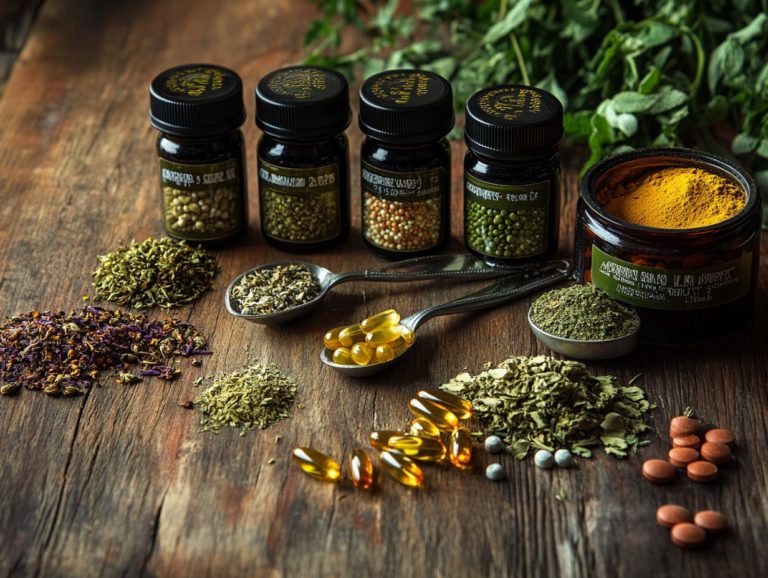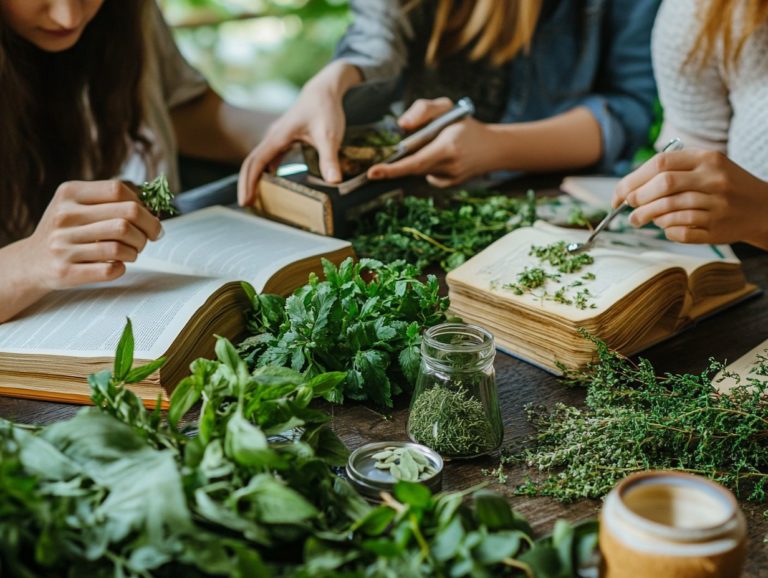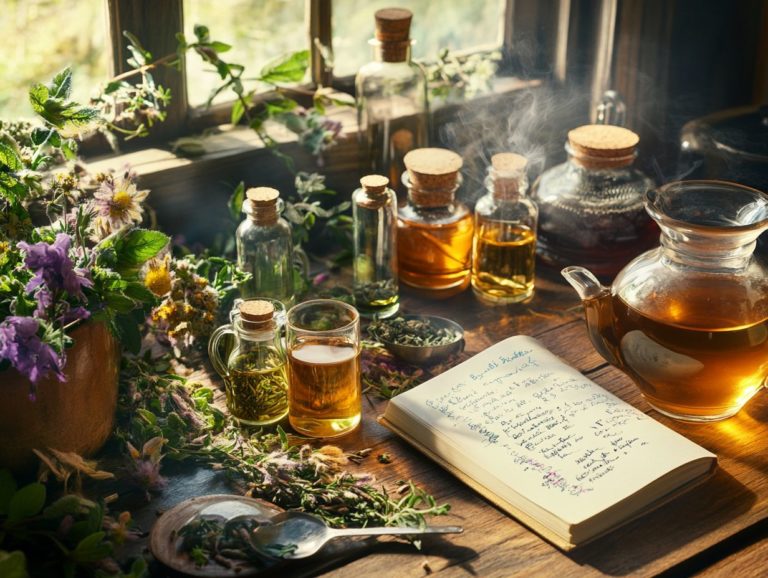Herbal Remedies and Age: Dosage Adjustments
Herbal remedies have been revered for their natural healing properties for ages, yet their effectiveness can differ widely across various age groups.
It s crucial to understand how to adjust dosages for children, adults, and seniors. This knowledge is key to maximizing benefits while minimizing risks, especially when using herbal supplements to treat diseases.
This guide delves into popular herbal remedies tailored to each age group, outlining recommended dosages, potential interactions, and important considerations for safe usage.
Whether you re a parent searching for solutions for your child or an adult looking to enhance your health through plant-based products, this information will provide you with invaluable insights.
Contents
- Key Takeaways:
- Herbal Remedies for Children
- Herbal Remedies for Adults
- Herbal Remedies for Seniors
- Guidelines for Adjusting Dosages
- Frequently Asked Questions
- What are herbal remedies?
- How does age affect the dosage of herbal remedies?
- Why do dosage adjustments for herbal remedies matter in older adults?
- How can I determine the appropriate dosage of herbal remedies for my age?
- Are there any herbal remedies that are not recommended for older adults?
- Can herbal remedies be used alongside traditional medications in older adults?
Key Takeaways:
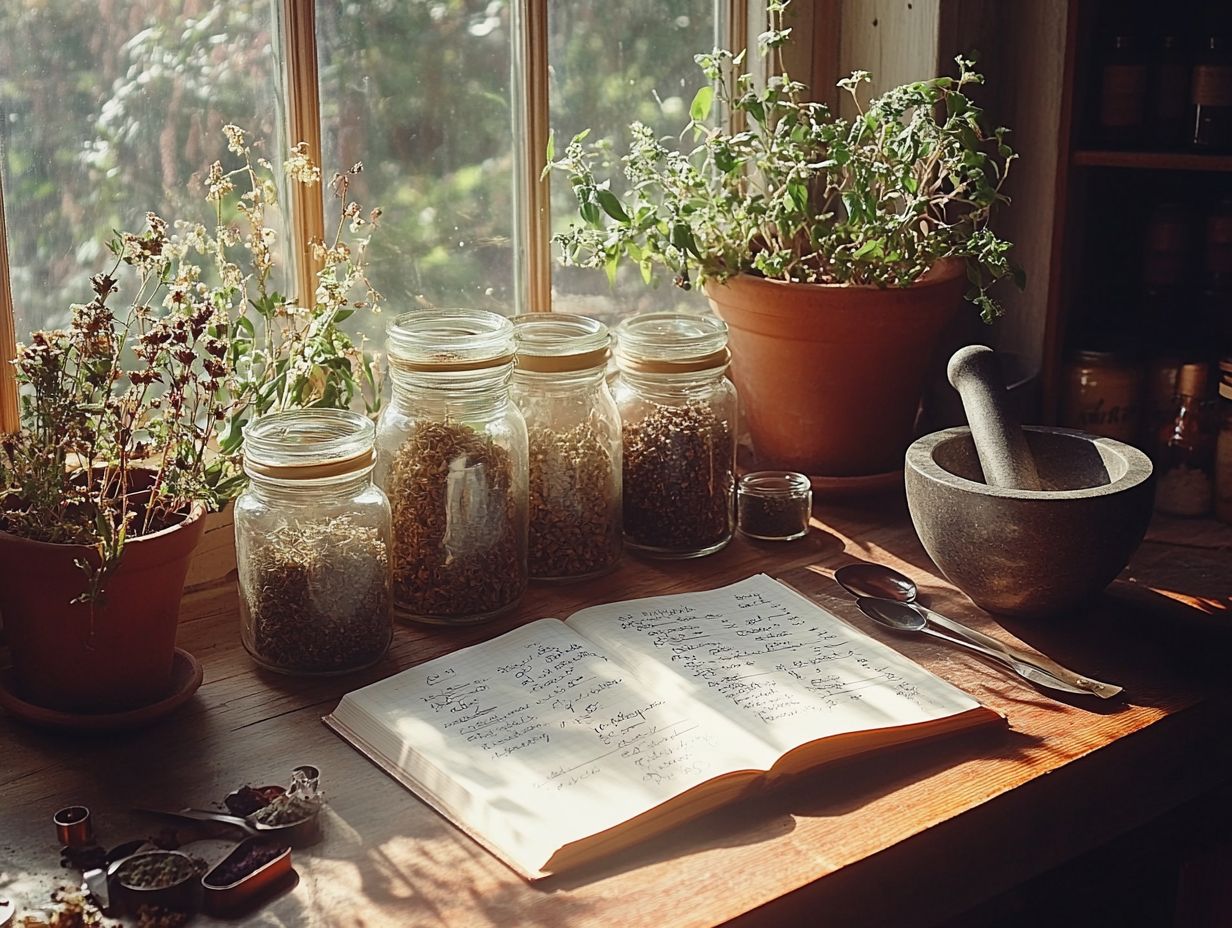
- Children and adults may require different dosages of herbal remedies due to variations in body size, metabolism, and potential interactions.
- When using herbal remedies for seniors, it is important to consider age-related changes in the body and potential risks, such as interactions with other medications and decreased organ function.
- To safely adjust dosages for different age groups, always consult a healthcare professional, consider individual factors, and closely monitor for any potential side effects.
What are Herbal Remedies?
Herbal remedies, often referred to as herbal supplements, are plant-based products that have stood the test of time. They have been utilized for centuries to combat diseases and promote health. These remedies are available in various forms, such as dried herbs, brewed teas, and liquid extracts, making them a cornerstone of herbal medicine and a favored option for those who prefer natural alternatives to conventional treatments.
Throughout history, they’ve been a significant aspect of many cultures and are often regarded as the foundation of traditional healing practices. In the realm of overall health care, these remedies address specific ailments while contributing to overall well-being. For example, you might turn to echinacea to boost your immune system, reach for valerian root for anxiety relief, or consider turmeric for its anti-inflammatory properties.
However, it’s vital to approach these supplements with care. Understanding herbal supplement labels and following recommended dosages is crucial to avoid unwanted side effects. This knowledge gives you the power to navigate the rich landscape of herbal remedies safely, including the role of body weight in herbal dosage, allowing you to weave these time-honored practices into your modern wellness routine seamlessly.
Why Dosage Adjustments are Necessary for Different Age Groups
Dosage adjustments for herbal supplements are critically important, as different age groups children, adults, and seniors experience varying responses that influence how the body reacts to these plant-based products.
For seniors, unique health considerations come into play, especially regarding long-term health issues. It is essential to consult a healthcare provider when determining the appropriate dosage.
Age significantly influences how your body processes herbal supplements. As you age, your body may not process these herbs as well as younger adults, leading to potential accumulation in your system and an increased risk of side effects.
If you have existing health conditions, such as diabetes or hypertension, be aware that certain herbs could interact adversely with your health. For example, ginseng might elevate blood pressure, posing a concern for those already managing hypertension.
Many seniors also take several prescription medications, which means that potential interactions could alter the effectiveness of both the herbal supplement and the prescribed conventional medicines.
This shows why it’s vital to follow established herbal dosage guidelines and prioritize safety principles, particularly for your well-being as an older adult, to prevent adverse reactions.
Herbal Remedies for Children
Herbal remedies for children can indeed be effective for addressing certain health conditions, particularly when sourced from reputable herbal manufacturers. However, it s essential to consult a healthcare provider before introducing any herbal supplements, as figuring it out on your own can lead to inappropriate use.
This step ensures not only safety but also efficacy. Children s bodies often respond differently to these plant-based products than those of adults. Prioritizing expert advice allows you to navigate the complexities of herbal treatments with confidence.
Commonly Used Herbs and Recommended Dosages
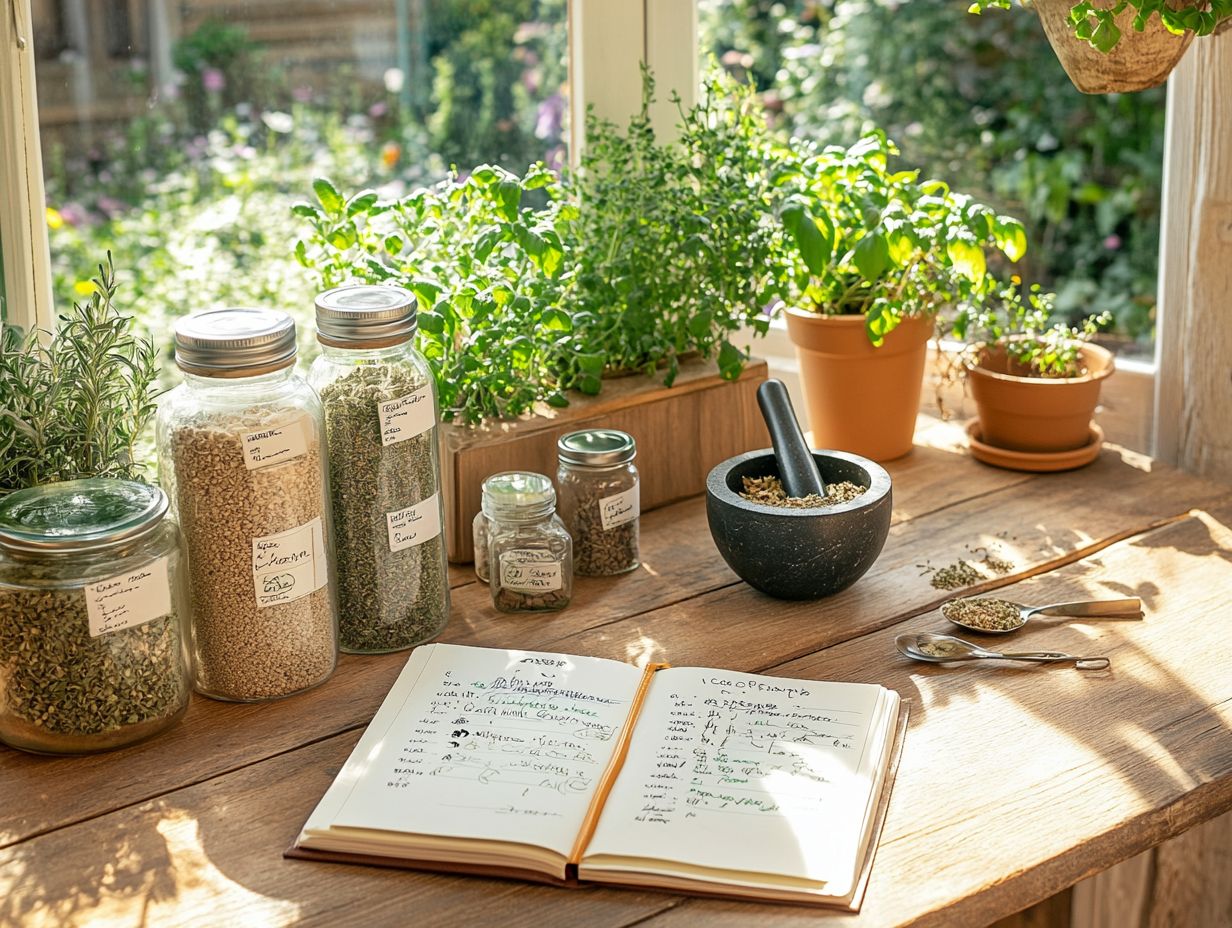
Commonly used herbs for children include St. John’s wort, turmeric, kariyat, and bai yanang. Each is renowned for its unique properties and benefits as herbal supplements. However, it s essential to stick to recommended dosages to ensure both safety and effectiveness of these herbal medicines.
For example, St. John’s wort is often embraced for its mood-enhancing effects. It provides valuable support for children grappling with emotional challenges or anxiety through holistic healthcare. Meanwhile, turmeric is celebrated for its anti-inflammatory properties, making it a favored ally for digestive health and overall wellness.
Kariyat, esteemed in traditional systems for its immune-boosting capabilities, proves particularly beneficial during the cold season. On the other hand, bai yanang is revered for its soothing qualities, promoting overall wellness as part of a holistic healthcare approach.
When considering these herbs for children, it’s crucial to consult healthcare professionals and herbalists, who are people that specialize in using plants for healing, about appropriate dosages. For more information on herbal safety, the developing bodies of children require thoughtful attention.
It s also important to source high-quality herbal products; reputable herbal manufacturers adhere to strict safety standards. This ensures that the herbal supplements are free from contaminants and potent enough to deliver their intended benefits.
Herbal Remedies for Adults
Herbal remedies for adults are increasingly sought after to address a range of health concerns. You can find these natural solutions effectively boosting the immune system, managing cardiovascular conditions, and supporting both the digestive system and respiratory system while maintaining health.
Whether through herbal supplements or thoughtfully crafted herbal tea preparations, these remedies offer a holistic approach to wellness.
Recommended Dosages and Potential Interactions
When using herbal supplements, it’s crucial for you to adhere to the herbal dosage guidelines. This ensures safe consumption and helps you avoid any adverse effects, especially if you have chronic conditions that may put you at a greater risk for interactions with herbal medicine.
For example, when considering echinacea, you might typically take between 300 to 500 mg per day to give your immune system a boost. Always consult healthcare providers for personalized advice. On the other hand, St. John’s Wort is commonly dosed between 900 to 1800 mg daily for those managing mood disorders and is frequently researched for its herbal medicine efficacy. Understanding the right amounts is crucial, so consider checking herbal supplements: understanding recommended dosages for more detailed guidance.
It’s essential to be aware that these herbs can interact with prescription medications, like blood thinners or antidepressants. This can potentially alter their effectiveness or even lead to adverse events. Therefore, before incorporating any herbal supplements into your routine, consulting with your healthcare provider and understanding herbal dosage is vital to ensure compatibility and safety.
Herbal Remedies for Seniors
Herbal remedies for seniors offer a wealth of benefits in tackling age-related health concerns. They are often explored in traditional Chinese medicine. However, consider potential side effects and interactions with other medications.
A thorough consultation with a healthcare provider before introducing any herbal supplements is not just advisable; it’s a critical step to ensure safety and efficacy.
Explore these natural options today, but always prioritize your child’s safety by consulting a professional!
Considerations for Aging Bodies and Potential Risks

Aging bodies respond differently to herbal supplements, making it essential for you to consider safety principles, the quality of herbal medicine, and potential risks of adverse reactions before integrating these remedies into your healthcare regimen, especially for elderly patients.
As you age, your metabolism tends to slow down. This change affects how your body absorbs and processes various substances, including herbal supplements and herbal extract dosage.
Alterations in liver function and gastrointestinal health can impact the effectiveness of these products and may lead to inconsistent results, emphasizing the need for knowledge about health. Choose high-quality herbal supplements and consider dosage tips for older adults. Purity and potency can differ greatly among brands.
Your healthcare provider is an invaluable resource in guiding you on safe dosages and monitoring for any possible interactions with prescription medications, especially concerning chronic diseases. Be smart about these remedies—your health is worth it! Take the time to educate yourself about each supplement, start with lower doses, and consult your healthcare provider for personalized advice tailored to your educational background. For specific information on herbal use, refer to the herbal dosage guidelines for pregnant women.
Guidelines for Adjusting Dosages
When adjusting dosages for herbal supplements, it s essential to adhere to established herbal dosage guidelines. These guidelines take into account factors such as understanding of health information and individual education levels.
It s imperative that any modifications you make are done in consultation with a qualified healthcare provider and respect FDA regulations, which are rules set by the Food and Drug Administration to ensure products are safe and effective.
Factors to Consider and Tips for Safe Usage
When considering herbal supplements, it s essential to weigh various factors, including your education level, the guidance of your healthcare provider, and the importance of avoiding self-diagnosis to mitigate risks of adverse events. Pay close attention to herbal supplement labels for accurate dosages and any potential risks associated with herbal medicine side effects.
Your lifestyle choices like diet, exercise, and stress management can significantly influence how effective these supplements are for you. Understanding your unique health conditions, such as diabetes or hypertension, is crucial, as some herbs may interact negatively with your prescribed medications. To ensure you are using them safely, be aware of common herbal dosage mistakes to avoid.
Your understanding of health information affects how you perceive herbal medicine; those with a deeper understanding often feel more empowered to make informed decisions. Consulting with healthcare providers can help bridge any gaps in knowledge and promote safer practices, fostering a more holistic approach to your health and wellness.
Frequently Asked Questions
What are herbal remedies?

Herbal remedies are natural substances derived from plants that are used to treat various health conditions. They have been utilized for centuries and are a popular alternative to traditional pharmaceuticals.
How does age affect the dosage of herbal remedies?
As we age, our bodies undergo various changes that can affect how we metabolize and respond to medications, including herbal remedies. Therefore, dosage adjustments may be necessary to ensure safety and effectiveness.
Why do dosage adjustments for herbal remedies matter in older adults?
Older adults may have decreased organ function, such as liver and kidney function, which can impact how their bodies process and eliminate medications. This can lead to a buildup of the herbal remedy in their system and potentially cause adverse reactions.
How can I determine the appropriate dosage of herbal remedies for my age?
The best way to determine the appropriate dosage of herbal remedies for your age is to consult with a healthcare professional. They can assess your overall health and any medications you may be taking to determine the safest and most effective dosage for you.
Are there any herbal remedies that are not recommended for older adults?
Yes, some herbal remedies can interact with medications commonly prescribed to older adults. These interactions may lead to unwanted side effects, so always check with your doctor before trying any herbal remedy!
Can herbal remedies be used alongside traditional medications in older adults?
Yes, herbal remedies can often be used alongside traditional medications. Just make sure to consult with a healthcare professional to check for interactions and ensure the best dosages for safety and effectiveness!

